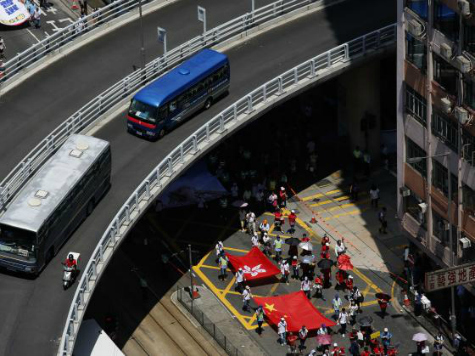On Sunday, a pro-China element staged a counter-protest in opposition to the pro-democracy demonstrations being held in Hong Kong in massive numbers. However, multiple media outlets have found evidence of demonstrators being paid hundreds of dollars just to show up and support Beijing’s side.
The New York Times wrote:
In separate reports on local television news channels, unidentified people were seen handing out cash to marchers – on a tour bus, on the street and in a park. In another instance, a member of a mainland Chinese chamber of commerce was videotaped slipping a total of 400 Hong Kong dollars, about $50, to two undercover journalists, saying, in Mandarin Chinese, “mei shi” (no worries) in a restaurant before a van ferried them to Victoria Park, where the march began. One of the television stations reported a man telling marchers to keep quiet about the money they received.
Anson Chan, the former second-highest ranking official in Hong Kong, told the Times:
We can all see this is an orchestrated attempt to oppose Occupy Central. They’d done it with inducement, they’d done it by twisting arms and they’d done it by importing people from the mainland. This is not a genuine reflection of people’s views.
Some 500,000 protesters, by some estimates, attended the annual July 1 marches protesting Chinese rule over Hong Kong. The massive pro-democracy movement, called Occupy Central with Love and Peace, has continued its surge in popularity as of late. Occupy Central is commonly understood as a nonviolent protest movement that is fighting for greater individual liberties for Hong Kong citizens.
On Friday, the Hong Kong Law Society passed a vote of no confidence to China’s president, rejecting a white paper from Beijing that demanded Hong Kong follow their governance. The white paper, released in June, demanded that Hong Kong stay within the bounds of China’s authority.
“The Law Society respects the decision of its members and has sent a clear and powerful message to defend the independence of the judiciary and to speak out against the white paper,” said Kevin Yam, a member of the 8,000-strong body.
Hong Kong was handed over from Great Britain to China in 1997 under the conditions of “one country, two systems,” which allowed Hong Kong citizens to preserve greater autonomy and guarantee rights such as free speech, which is not recognized in mainland China.

COMMENTS
Please let us know if you're having issues with commenting.